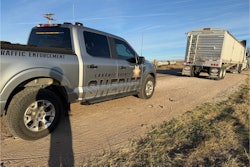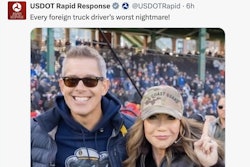In early November, trucking's national security nightmare became a reality: the Department of Homeland Security reported it found a "wanted terrorist driving an 18 wheeler" in Kansas.
DHS blamed the previous administration for granting that Uzbekistani driver, Akhror Bozorov, work authorization, and pointed the finger at Pennsylvania Gov. Josh Shapiro for granting him a CDL.
Bozorov reportedly entered the country in 2023, but his Pennsylvania non-domiciled CDL was issued this year in July, during the current Trump administration, even after the U.S. Department of Transportation began to audit the issuance of non-domiciled CDLs the nation over on order from the President.
Furthermore, DHS cleared Bozorov to get a CDL, and Shapiro said licensing an accused terrorist could easily happen again.
"Should accused terrorists be driving 18-wheelers on U.S. highways? Who is doing the vetting here?" a Fox Business news anchor recently asked ICE Deputy Director Madison Sheahan.
Sheahan responded that "this should never have happened" and that ICE is working with state partners to "stop these people on our highways."
But to more directly answer the anchor's question: DHS is doing the vetting of foreign non-domiciled CDL applicants, including the "wanted terrorist" in question -- before they get on the highway.

[Related: Can courts stop DOT's crackdown on foreign CDL drivers?]
Terrorism and trucking: DHS asleep at the wheel?
The U.S. DOT's Federal Motor Carrier Safety Administration, in its September 29 emergency rulemaking seeking to force nearly 200,000 non-citizen CDL holders out of truck driving and other CDL work, cited terrorism concerns as one urgent reason for the aggressive action.
Overdrive readers, likewise, have long fretted about the potential for non-vetted border crossers to get behind the wheel of an "80,000-pound missile," in the words of one of those readers.
The emergency rulemaking was officially blocked by the federal Court of Appeals for the District of Columbia Circuit, with judges deciding that drivers stripped of their CDLs on the explicit basis of citizenship status, or lack thereof, would be likely to win on the merits and fully overturn the rule. Whatever national security, safety, or economic fairness arguments DOT mustered in trying to justify expelling foreign drivers did not matter to the court. It found these drivers had reasonable claim to their CDLs, enough at least to pause the rule until litigation proceeds fully.
[Related: Non-domiciled CDLs back in action after court blocks DOT's rule?]
In response to the court ruling, DOT Secretary Sean Duffy reiterated his agency's intention to nonetheless continue fighting to "keep dangerous, unqualified truck drivers off the road." Though the court's ruling effectively re-opened non-domiciled CDL issuance as a possibility, none of the states Overdrive consulted for recent reporting have begun re-issuing them. Meanwhile, ICE raids in collaboration with state authorities have continued apace, with arrests of dozens of CDL drivers following traffic stops and scale-house blitzes in several states.
The arrest of 31-year-old Akhror Bozorov on November 9 in Kansas made headlines as Bozorov was a wanted man in his homeland of Uzbekistan, according to DHS, where he'd reportedly shared jihadist propaganda.
Soon after the news of the "wanted terrorist" arrest broke, DOT put Pennsylvania on notice that it could lose $75 million in federal funding for lapses in its non-domiciled CDL issuance processes. The state joined California in being required under special order to halt non-domiciled issuance and reform licensing processes -- those orders remain separate from and outside of the appeals court ruling's jurisdiction.
What's the right number of terrorists with CDLs? Zero, obviously.
Yet when Overdrive consulted with Pennsylvania for this story, Gov. Shapiro said if Bozorov applied for a non-domiciled CDL today, DHS's systems would still greenlight him for it.
Pennsylvania fires back at DHS
"Any time a non-citizen applies for a CDL, the Commonwealth of Pennsylvania is required to go and check a federal database, in order to see whether or not that individual qualifies to be able to receive a CDL," Shapiro said at a recent press conference in response to Bozorov's arrest. "We checked the federal database months ago, when this individual received his CDL, and he was authorized to get it by the federal database."
At the time of the press conference, Shapiro noted that, "ironically, we went and checked the database yesterday -- he’s still qualified to get a CDL."
Shapiro's account of the situation lines up with what both California and New York have previously said when challenged over CDL practices by federal and/or other state authorities -- states do not "vet" or do extensive background checks on non-domiciled CDL applicants. Federal authorities do.
And while DHS and DOT have railed against New York and California for issuing "No Name Given" CDLs to drivers who don't even give a first name, it's actually explicit federal policy to license people that way.
“If New York wants to hand out CDLs to illegal immigrants with ‘No Name Given,’ that’s on them. The moment they cross into Oklahoma, they answer to our laws,” said Oklahoma Gov. Kevin Stitt following ICE raids on I-40 that found a non-domiciled CDL from New York with only one name listed.
But Overdrive consulted with Oklahoma licensing authorities, and it is indeed legal (and the actual practice in Oklahoma) to issue CDLs to people who only give one name. "It is legal to drive in Oklahoma with a CDL listing 'No Name Given' when that name format matches the source documents presented at the time of application," a spokesperson for Oklahoma's motor vehicle department told Overdrive. "This is a federal provision that states must follow based on a person’s identifying documentation."
That's exactly what California said when a cargo thief was busted and much hay was made over a "No Name Given" CDL: States simply match the name on the CDL to the name on the work authorization, which DHS itself grants.
Overdrive has repeatedly queried DHS about whether it's made any changes to, or has any plans to change, its processes for granting work authorization. DHS hasn't responded.
Pennsylvania Gov. Shapiro laid the blame squarely on the federal government. "Look, I think there are real questions here. If you get rid of the political theatrics that I know most of the people are engaged in, and you really look at the questions -- there are real questions," he said. "The questions, though, have to be directed to the U.S. Department of Homeland Security and its database that is run by Secretary [Kristi] Noem."
Noem and DHS are "clearly are not minding the shop and they’ve gotta get better, because every single state in the country relies on this database when making a determination as to who qualifies for a CDL," Shapiro concluded.
DHS in August vowed to "to root out and prevent illegal aliens from obtaining these licenses from sanctuary jurisdictions that put American drivers and passengers in danger."
But Overdrive reporting showed that, prior to FMCSA's September rule change, all but seven states in the U.S. issued CDLs to non-citizens who have DHS-issued temporary work authorization -- not just so-called sanctuary states. And when even states like California issue CDLs to non-citizens, they do so with DHS's blessing, according to state licensing authorities.
[Related: Non-domiciled CDLs: First-ever real data reveals at least 60,000]











